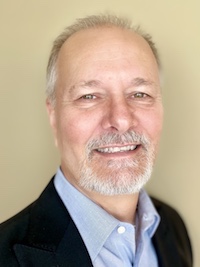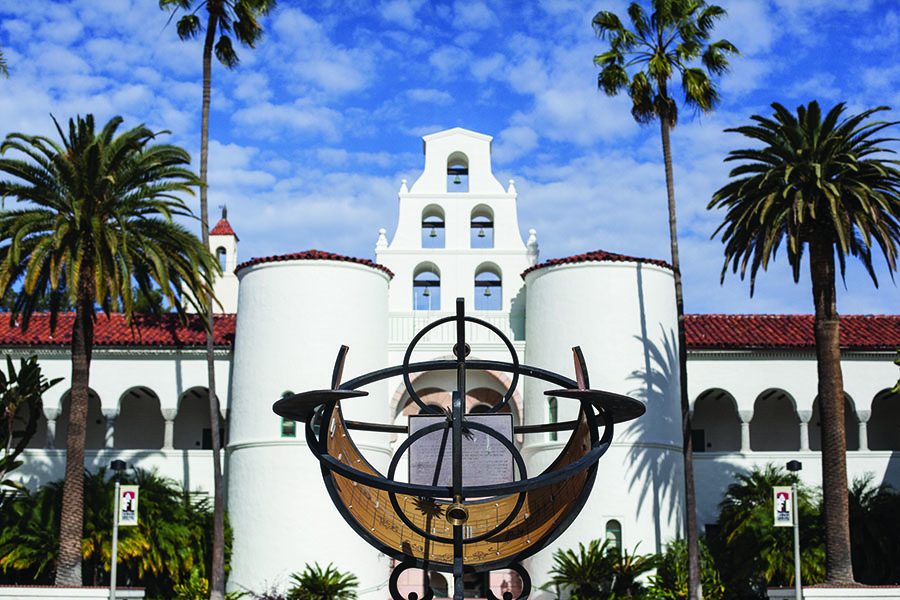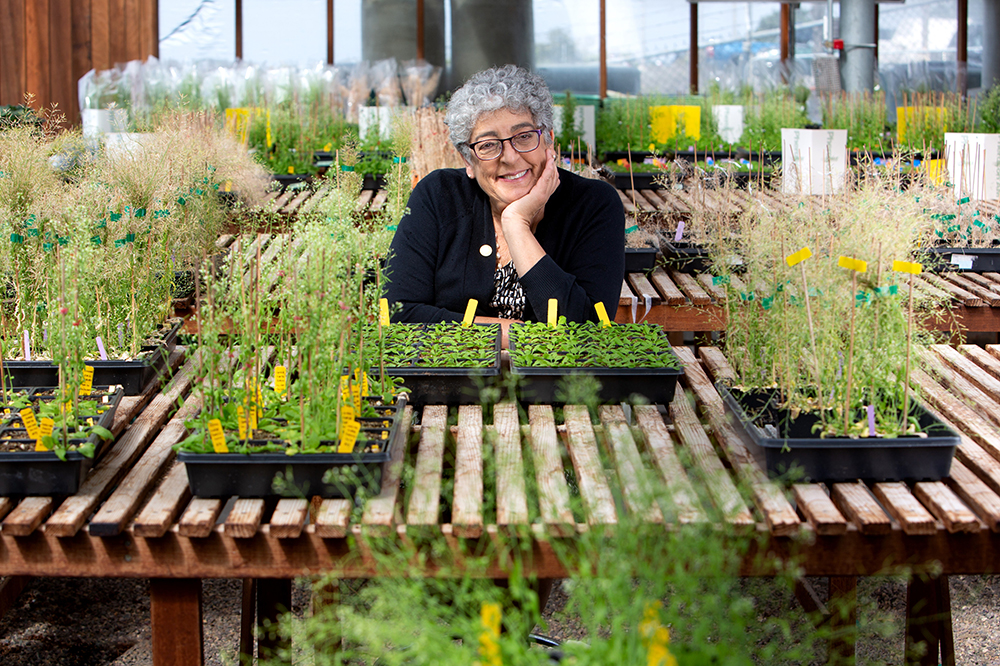Daily Business Report-Oct. 8, 2020
Joanne Chory is the director of the Plant Molecular and Cellular Biology Laboratory at The Salk Institute. (Photo courtesy of The Salk Institute)
Salk Institute’s Joanne Chory wins
the 2020 Pearl Meister Greengard Prize
Joanne Chory, who pioneered the application of molecular genetics to plant biology and transformed our understanding of photosynthesis, will receive the 2020 Pearl Meister Greengard Prize, Rockefeller’s preeminent award recognizing outstanding women scientists.
Chory is the Howard H. and Maryam R. Newman Chair in Plant Biology and director of the Plant Molecular and Cellular Biology Laboratory at The Salk Institute. She is also a Howard Hughes Medical Institute Investigator. Frances Beinecke, former president of the Natural Resources Defense Council, will present the prize in a virtual ceremony hosted by Rockefeller on Oct. 22.
Chory’s three decades of work with Arabidopsis thaliana, a small mustard plant known as thale cress, renders her one of the most influential plant biologists of her generation. Early in her career, Chory discovered that the DET1 gene was responsible for determining how plants respond to light, a finding that eventually led to her uncovering the entire plant steroid hormone signaling system and the unique roles of brassinosteroid and auxin hormones.
More recently, Chory has spearheaded an ambitious effort to combat climate change by optimizing plants’ natural ability to capture and store carbon. As director of the Harnessing Plants Initiative at Salk, she heads a research team working to alter key genetic pathways to produce crop variants with deeper roots that can pull more carbon out of the atmosphere and store it underground. In 2019, Salk received a $35 million award from the TED Audacious Project in support of the initiative.
“From her earliest work, which fundamentally changed researchers’ understanding of plant growth and development, to her groundbreaking efforts to combat climate change, Dr. Chory’s remarkable contributions stand to benefit all life on Earth,” says Michael W. Young, Richard and Jeanne Fisher Professor and vice president of academic affairs at Rockefeller, Nobel laureate, and chair of the Pearl Meister Greengard Prize selection committee.
_________________________________

centrexIT and Biocom launch
new IT platform to streamline
business operations for life science companies
centrexIT, an information technology services provider helping businesses thrive through technology, and Biocom, California’s leading life science member association, announced the launch of IT Deal Desk. The latest platform provides Biocom members with exclusive access to an extensive, vetted partner network and simplifies the task of negotiating and securing agreements on members’ behalf.
IT Deal Desk is a serverless, cloud-based IT service designed to eliminate the hassle of vetting new technology providers, collecting proposals and negotiating deals. From startups to publicly traded companies, the platform works on behalf of Biocom’s 1,300 member companies, using collective buying power to negotiate cost-effective rates from a robust network of over 300 premium internet, voice, cloud, IT and cybersecurity partners.
Rather than aimlessly selecting providers one at a time, IT Deal Desk allocates requests to a vetted group of premier partners who run a complete company analysis, obtain proposals and register deals on a member’s behalf.
IT Deal Desk is available now. Biocom members can access the platform by visiting www.ITDealDesk.com or going through the centrexIT and Biocom websites.
_________________________________
Foundation Medicine expands research
and development operations in San Diego
Foundation Medicine announced plans to increase the company’s operational capacity at a new facility in San Diego. The site will primarily be used for additional research and development laboratories to accommodate expanded capabilities for the Cambridge, Mass.-based, cancer genomics insights company.
Foundation Medicine’s new location will include more than 63,000 square feet of mixed-use space optimized for both laboratory operations and research and development. The new office will consolidate the company’s two San Diego locations under one roof in Torrey Pines, the center of the city’s life science cluster.
The new laboratory space, projected to be complete next year, will help to expand testing capacity of the company’s recently FDA-approved FoundationOne Liquid CDx liquid biopsy test. Additionally, with Foundation Medicine’s acquisition of Lexent Bio in June, the new space will allow for increased research and development of low-pass whole genome sequencing and DNA methylation analysis.
“This state-of-the-art facility provides the opportunity to further expand our R&D and laboratory operations and supports our focus on advancing personalized medicine for patients,” said Foundation Medicine’s Chief Scientific Officer Priti Hegde, Ph.D. “The San Diego region is home to more than 1,200 life sciences companies—we’re excited to embed ourselves in this burgeoning community, deepen our local partnerships and add this high-quality lab space to expand into new projects.”
_________________________________
Making space weather forecasts faster and better
In August 1859, a massive solar storm knocked out the global telegraph system. Some telegraph operators were hit by electric shocks; others saw sparks flying from cable pylons. Telegraph transmissions were halted for days.
The damage was due to a geomagnetic storm caused by a series of coronal mass ejections–giant bursts from the sun’s surface–that raced across the solar system and saturated Earth’s atmosphere with magnetic solar energy.
If a solar storm of similar scale occurred today, it would cause worldwide blackouts, massive network failures and widespread damage to the satellites that enable GPS and telecommunication. Worse still, it would threaten human health due to increased levels of radiation.
The arrival and intensity of these solar storms can be difficult to predict. To improve the ability to forecast space weather, a multidisciplinary team of researchers, including Professor Boris Kramer at the University of California San Diego, received $3.1 million from the National Science Foundation. The researchers, led by Professor Richard Linares at the Massachusetts Institute of Technology, will also work on speeding up the forecasting abilities that are currently available.
_________________________________
Study: Statins reduce COVID-19 severity
There are no Food and Drug Administration (FDA)-approved treatments for COVID-19, the pandemic infection caused by a novel coronavirus. While several therapies are being tested in clinical trials, current standard of care involves providing patients with fluids and fever-reducing medications. To speed the search for new COVID-19 therapies, researchers are testing repurposed drugs — medicines already known to be safe for human use because they are FDA-approved for other conditions — for their abilities to mitigate the virus.
UC San Diego Health researchers recently reported that statins — widely used cholesterol-lowering medications — are associated with reduced risk of developing severe COVID-19 disease, as well as faster recovery times. A second research team at UC San Diego School of Medicine has uncovered evidence that helps explains why: In short, removing cholesterol from cell membranes prevents the coronavirus from getting in.
_________________________________
Mark Anderson named COO
for San Diego’s Endeavor Bank

Mark Anderson has been named chief operations officer of San Diego-based Endeavor Bank. While having roots in Minnesota, Anderson and his family moved to the San Diego area when he was 9 years old. He began his banking career working part-time for a community bank while attending Poway High and continued while attending San Diego State.
Anderson has over four decades of banking and operations experience, and several prior roles as EVP/COO in local community banks. He was most recently SVP, director of branch banking, for Pacific Premier Bank, which acquired Grandpoint Bank in 2018, where he held the title of EVP, branch operations administrator.
Prior to that, Anderson was with Regents Bank as chief operations officer after Regents acquired California Community Bank in 2012. He was a founding organizer of CCB where he spent nine years as executive vice president, COO.
Anderson and his wife Debbie live in Vista and have three grown children, with three grandchildren, and another on the way. His community involvement includes fundraising efforts for organizations such as the San Diego Food Bank, the Alzheimer’s Association, and Susan G Komen for the Cure.
_________________________________
Meallogix secures $1.25 in seed funding round
FoodBev Media
Meal preparation software provider Meallogix has raised $1.25 million in an oversubscribed seed funding round. The San Diego-based start-up’s software automates operations and business processes for meal prep company owners.
Meallogix claims to remove operational barriers and digitise every step of the supply chain, including order intake, nutrition label and shopping list creation, ingredient conversion and recipe costing.
The Meallogix dashboard is said to provide important financial insights to meal prep business owners, showing them which menu items drive profits and which do not.
“To raise seven figures during a seed round, have it be oversubscribed, and achieve that during a global pandemic is a testament to the exceptional product we offer and the team behind it,” said Meallogix founder and CEO, Ted Stearns.
The company says that it will use the new funds to continue to build out the Meallogix platform, scale operations, grow its global team and expand partnerships.
_________________________________
Cal State San Marcos awarded $1.7 million
to help students succeed in college
Cal State San Marcos’ TRIO Student Support Services program will receive a federal grant of more than $1.7 million over five years, the U.S. Department of Education announced. The funding for the first year is $348,002, a 3.5 percent increase over last year.
TRIO SSS is funded by the U.S. Department of Education to support 206 CSUSM students who meet at least one of the following criteria: They come from a low-income background, they are a first-generation college student and/or they have a verified disability. The program offers academic, personal and professional support to increase the retention and graduation rates of participants.
TRIO SSS has been continually funded at CSUSM since 1993. The university has three objectives upon which it is measured each year: retention of participants, good academic standing of all participants, and six-year graduation rate. CSUSM reached and surpassed its targets in each area, including for the past five years.
_________________________________

San Diego State enrolls the largest
number of students since 2008
By Patrick Doyle | Staff Writer, The Daily Aztec
San Diego State has reported the largest enrolled class in 12 years, consisting of 35,578 graduate and undergraduate students.
Transfer students saw the most drastic increase in enrollment numbers, jumping from 4,146 in 2019 to 4,482 this year. However, the number of international students enrolled decreased from 1,770 last year to 1,395 this year.
This net increase of 500 students from last year is the largest number of students the university has enrolled since 2008 when the United States experienced a similar economic downturn as it is experiencing throughout the COVID-19 pandemic. Some students argue that SDSU is enrolling more students as a way to bring in more tuition and fees during the tough economic climate.
However, associate vice president for enrollment management Stefan Hyman said the increased enrollment numbers during both of these rough economic periods are coincidental, having been planned out ahead of time due to the need for the university to be prepared.
“The majority of our enrollments were already set prior to the summer,” Hyman said. “We had been planning for growth by about 350 enrollments pre-COVID. So the increase in 500, we went a little bit over what he had been planning, but not that much. The way that I look at it we came in really really close to what we were targeting.”
_________________________________
Kratos awarded $29.2 million Navy contract
for BQM-177A Subsonic Aerial Target
San Diego-based Kratos Defense & Security Solutions Inc. has received an initial $29.2 million contract for Lot 1 of the BQM-177A Subsonic Aerial Target (SSAT) from the U.S. Navy for the procurement of 35 targets aircraft and technical data.
“This FRP 1 award, coupled with the site activation efforts we are undertaking around the globe in support of the U.S. Navy, in spite of the significant challenges posed by the current pandemic, represents a huge stride forward towards achievement of Full Operational Capability for the BQM-177A SSAT within the coming fiscal year,” said Steve Fendley, president of Kratos Unmanned Systems Division.
_________________________________
California Lottery
October marks the 35th anniversary of California Lottery games – 35 years of providing supplemental funding for public education. The Lottery is marking its anniversary by highlighting recent record-breaking sales of its new Pac-Man Scratchers®which, along with its robust marketing campaign, fittingly pays homage to the ‘80s.
The Pac-Man Scratchers games – available at $2, $5 and $10 – hit markets on Sept. 14. Thanks largely to this new family of games, Lottery Scratcher sales broke an all-time record with nearly $120 million worth of tickets sold in a single week. The second week saw an even bigger Scratchers sales record, coming in at $121.4 million. The previous Scratchers sales record dates back to the start of the Lottery in October of 1985
In 1984, California voters passed Proposition 37 – the California State Lottery Act – to authorize the creation of a lottery; the first California Lottery tickets were sold on Oct. 3, 1985.
_________________________________
NAWBO Awards
The San Diego Chapter of the National Association of Women Business Owners, NAWBO San Diego, has reinvented a 15-year-old awards event into a web educational mini-series. The 2020 BRAVA Awardswill celebrate the accomplishments of local businesswomen on Oct. 23, 2020 from 5-6p.m.
_________________________________
Freight Truck emissions
In 2018, freight trucks percent of the greenhouse gas emissions in 2018, and by sector, transportation contributes an overall 28 percent of those emissions.
Shared truckloads on less than load (LTL) freight, which lets several shippers share space in one full semi-truck, could reduce carbon emissions according to Lu Saenz, VP of Engineering and Product Development at Flock Freight.
Saenz says there’s a huge benefit to adopting the new shared truckload model in the logistics industry.
“With the traditional LTL model, freight zigzags through the outdated hub-and-spoke system and is wasteful in its approach both in the time it takes shipments to arrive on shelves and environmentally, but also because items are constantly getting damaged by being taken on and off trucks along the route,” said Saenz.
In September 2020, Walmart announced it will require its suppliers and their carriers to deliver all orders by their “must-arrive-by” dates 98% of the time or be fined three percent of the cost of the goods.



